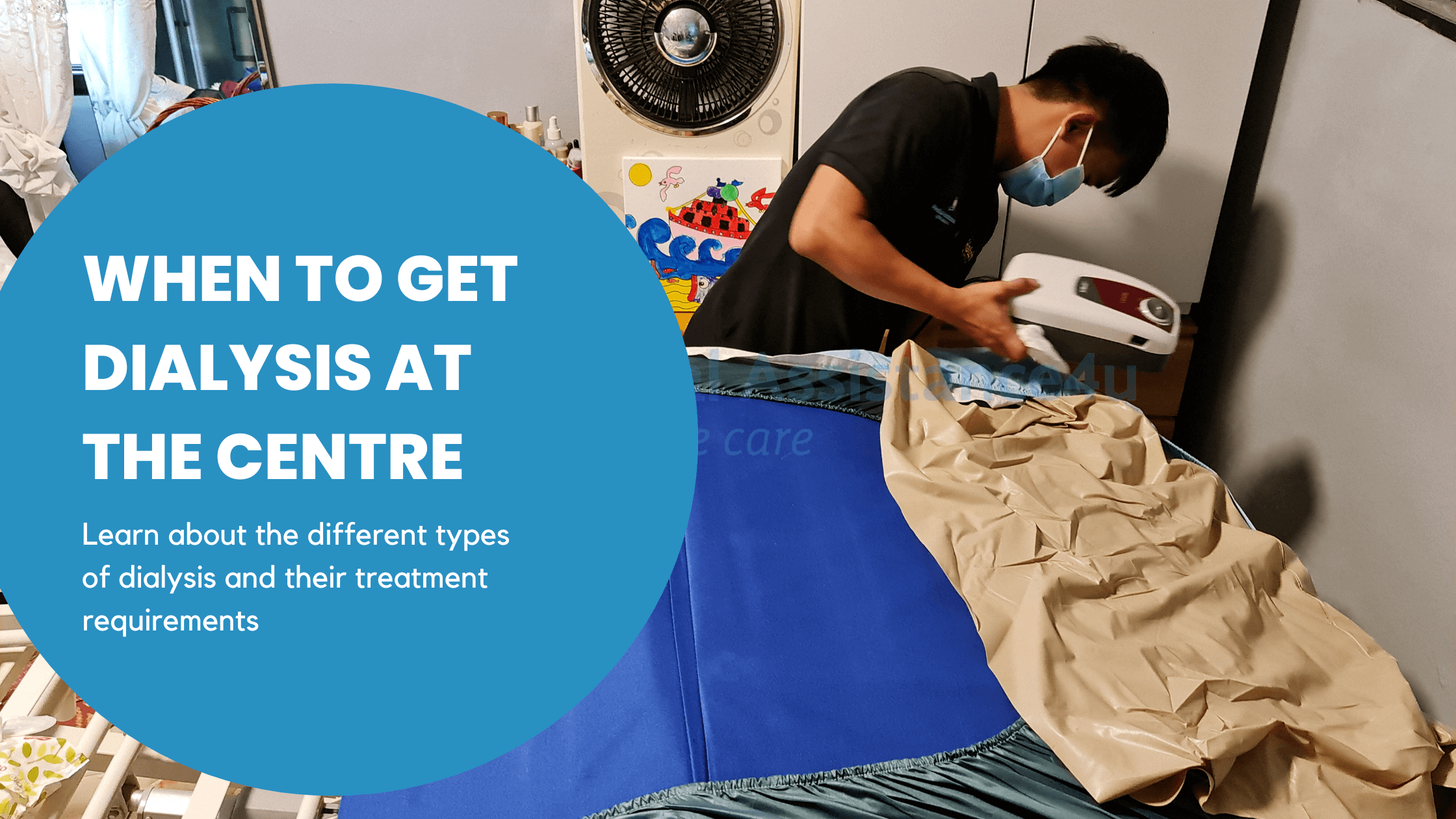How Often Do Patients Need Dialysis at the Centre?
- Medicalassistance4u
- January 20, 2023
- Caregiving, Dialysis

What is Dialysis?
Dialysis is the process of artificially removing waste products and fluid from the blood. This is usually done by our kidneys and dialysis is required when one’s kidneys are not functioning properly.
People with chronic kidney failure normally require regular dialysis for life, unless or until they receive a kidney transplant. Those who are acutely ill may also need dialysis for short periods in an intensive care setting
There are 2 types of dialysis – hemodialysis and peritoneal dialysis. Treatment can be done at home or at the dialysis centre depending on the type of dialysis the patient opts for.
Type of dialysis | Hemodialysis | Petritoneal Dialysis | |
Continuous Ambulatory Peritoneal Dialysis (CAPD) | Automated Peritoneal Dialysis (APD) | ||
Where can dialysis be done? | Dialysis centre | At home | At home |
How often does dialysis need to be done? | 3 times per week | 3 – 5 times per day | 1 time per day |
How long does a dialysis session last? | 4 – 6 hours | 20 – 30 minutes | 8 – 10 hours |
Can dialysis be done manually? | No | Yes | No |
Hemodialysis
This procedure removes waste and extra fluid from the blood. Minor surgery is needed to create access to the patient’s blood. The blood is then pumped into a dialysis machine and filtered by a dialyzer (also known as an artificial kidney). After being filtered, the blood is returned to the patient’s bloodstream.
As the blood vessel needs about 2 to 3 months after surgery to be ready for dialysis, the patient would receive hemodialysis from a temporary access point through a plastic tube around the neck or chest.
Hemodialysis is usually done at a dialysis centre. Patients need to travel to a dialysis centre to receive hemodialysis about 3 times per week, with each session lasting around 4 to 6 hours.
Healthcare providers can connect patients with suitable dialysis centres around Singapore.
Peritoneal dialysis
This procedure cleans the blood inside of the patient’s body. A cleansing solution is pumped into the patient’s abdomen. With the abdomen lining acting as a natural filter, waste and extra fluid passes from the blood into the cleansing solution.
Peritoneal dialysis is a daily home-based treatment that can be performed by the patients themselves or their caregivers. Only one night at the hospital is needed for a minor surgery to create an access point in the belly and to insert a soft plastic tube through. A healthcare professional will teach the patient and/or their caregiver how to perform peritoneal dialysis at home.
As this is a home-based treatment, there needs to be sufficient space in the house to store the peritoneal dialysis equipment. The home also needs to be kept sanitary to avoid any infections.
Depending on the type of peritoneal dialysis, the treatment can be done manually or by a machine.
1. Continuous Ambulatory Peritoneal Dialysis (CAPD)
CAPD is done manually, 3 to 5 times per day.
Each session takes about 20 to 30 minutes and patients are able to continue with normal daily activities between each session.
2. Automated Peritoneal Dialysis (APD)
APD is done by a machine in the home on a daily basis.
While only 1 session is needed per day, a session takes around 8 to 10 hours and is usually done when the patient is sleeping. Patients are able to continue with normal activities in the day.
At Medical Assistance4u
Our team of medically trained staff at Medical Assistance4u can provide you with consultation services to assist you in providing good elderly care and finding the right assistive tool and medical equipment.
We also provide services like installation and repair services, relocation and disposal services for bulky medical equipment, home care services and transport for your wheelchair-bound loved ones.

